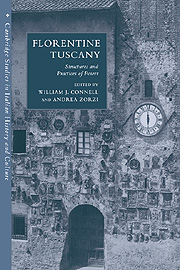Book contents
- Frontmatter
- Contents
- List of figures
- List of tables
- List of abbreviations of archival sources
- Introduction
- 1 The ‘material constitution’ of the Florentine dominion
- 2 The language of empire
- 3 Constitutional ambitions, legal realities and the Florentine state
- 4 Fiscality, politics and dominion in Florentine Tuscany at the end of the middle ages
- 5 Market structures
- 6 State-building, church reform and the politics of legitimacy in Florence, 1375–1460
- 7 The humanist citizen as provincial governor
- 8 Territorial offices and officeholders
- 9 Demography and the politics of fiscality
- 10 Florentines and the communities of the territorial state
- 11 Patronage and its role in government: the Florentine patriciate and Volterra
- 12 San Miniato al Tedesco: the evolution of the political class
- 13 The social classes of Colle Valdelsa and the formation of the dominion (fourteenth–sixteenth centuries)
- 14 Arezzo, the Medici and the Florentine regime
- 15 Rubrics and requests: statutory division and supra-communal clientage in Pistoia
- 16 A comment
- Index
- CAMBRIDGE STUDIES IN ITALIAN HISTORY AND CULTURE
10 - Florentines and the communities of the territorial state
Published online by Cambridge University Press: 16 September 2009
- Frontmatter
- Contents
- List of figures
- List of tables
- List of abbreviations of archival sources
- Introduction
- 1 The ‘material constitution’ of the Florentine dominion
- 2 The language of empire
- 3 Constitutional ambitions, legal realities and the Florentine state
- 4 Fiscality, politics and dominion in Florentine Tuscany at the end of the middle ages
- 5 Market structures
- 6 State-building, church reform and the politics of legitimacy in Florence, 1375–1460
- 7 The humanist citizen as provincial governor
- 8 Territorial offices and officeholders
- 9 Demography and the politics of fiscality
- 10 Florentines and the communities of the territorial state
- 11 Patronage and its role in government: the Florentine patriciate and Volterra
- 12 San Miniato al Tedesco: the evolution of the political class
- 13 The social classes of Colle Valdelsa and the formation of the dominion (fourteenth–sixteenth centuries)
- 14 Arezzo, the Medici and the Florentine regime
- 15 Rubrics and requests: statutory division and supra-communal clientage in Pistoia
- 16 A comment
- Index
- CAMBRIDGE STUDIES IN ITALIAN HISTORY AND CULTURE
Summary
The study of urban history has increasingly focused on the reconstruction of ties of kinship, neighbourhood and the issue of social patronage generally. Although the conclusions reached have often differed, the result of such study has been the emergence of an image of Renaissance man bound into a multitude of social network systems that fundamentally conditioned both the practice and conceptualisation of daily life. More recently, patronage studies have moved beyond the walls of Florence itself to consider the city's territorial state, paying particular attention to the complex interrelations between the Florentines and the inhabitants of the subject communities. With the territorial expansion of the Florentine dominio, the numbers of Florentines in the cities and rural communities of Tuscany increased with respect to the recent past. Significantly, many Florentines occupied positions as resident judicial officials in the subject towns for a period of several months, whilst merchants and rich bankers invested capital in the fertile Arno valley and along the coast, or built their country retreats in the areas from which their families originated. Many of these Florentines demonstrated their growing interest in the territories by establishing private networks with the indigenous populations and they were often in a position to exercise influence over the political and administrative life of the subject towns themselves.
The Florentine state of the Quattrocento was a recent phenomenon.
- Type
- Chapter
- Information
- Florentine TuscanyStructures and Practices of Power, pp. 207 - 224Publisher: Cambridge University PressPrint publication year: 2000
- 1
- Cited by

